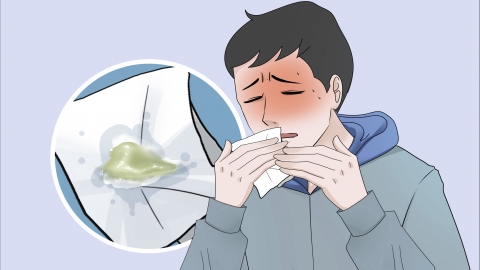What causes a sore throat with phlegm, and what should I do?
Generally, the term "throat" refers to the pharynx. Pharyngeal itching and phlegm may be related to dryness of the throat, environmental irritants, allergic rhinitis, reflux pharyngitis, acute bronchitis, or other causes. It is recommended to seek medical attention promptly and undergo general treatment, medication, or other treatments under the guidance of a physician. Detailed explanations are as follows:

1. Dry throat
When the pharyngeal mucosa becomes excessively dry, it can easily cause a sensation of itching in the throat. The mucosa may secrete phlegm in an attempt to lubricate itself. It is recommended to appropriately use a humidifier to maintain moist indoor air.
2. Environmental irritation
Small particles in the air such as dust, pollen, and chemical substances can irritate the pharyngeal mucosa, causing local inflammation and allergic reactions, which may result in itching and phlegm production. It is recommended to wear a mask to reduce the inhalation of external irritants.
3. Allergic rhinitis
Allergic rhinitis is usually triggered by allergens such as pollen or dust mites. The stimulation by allergens increases nasal secretions, some of which may flow into the throat, causing throat itching and phlegm. It is often accompanied by symptoms such as paroxysmal sneezing, clear nasal discharge, and nasal congestion. Treatment may include medications such as azelastine fluticasone nasal spray, budesonide nasal spray, and triamcinolone acetonide cream, as directed by a physician.
4. Reflux pharyngitis
Reflux pharyngitis is caused by the backflow of stomach contents into the throat. Substances like stomach acid in the refluxate can irritate the throat, causing sensations of itching and increased phlegm production. Symptoms often include hoarseness, throat pain, and difficulty swallowing. Medications such as domperidone tablets, sucralfate chewable tablets, and omeprazole enteric-coated capsules may be used under a physician's guidance for treatment.
5. Acute bronchitis
Acute bronchitis is typically caused by viral or bacterial infections, leading to congestion, edema, and inflammation of the bronchial mucosa. Inflammatory stimulation increases bronchial secretions, some of which may irritate the throat, causing itching and phlegm. Symptoms may also include coughing, low-grade fever, and difficulty breathing. Treatment may involve medications such as dextromethorphan hydrobromide tablets, pentoxyverine citrate tablets, and compound salbutamol sulfate aerosol, as directed by a physician.
In daily life, maintaining good eating habits, avoiding spicy and greasy foods, and reducing tobacco and alcohol consumption are important for maintaining throat health.




